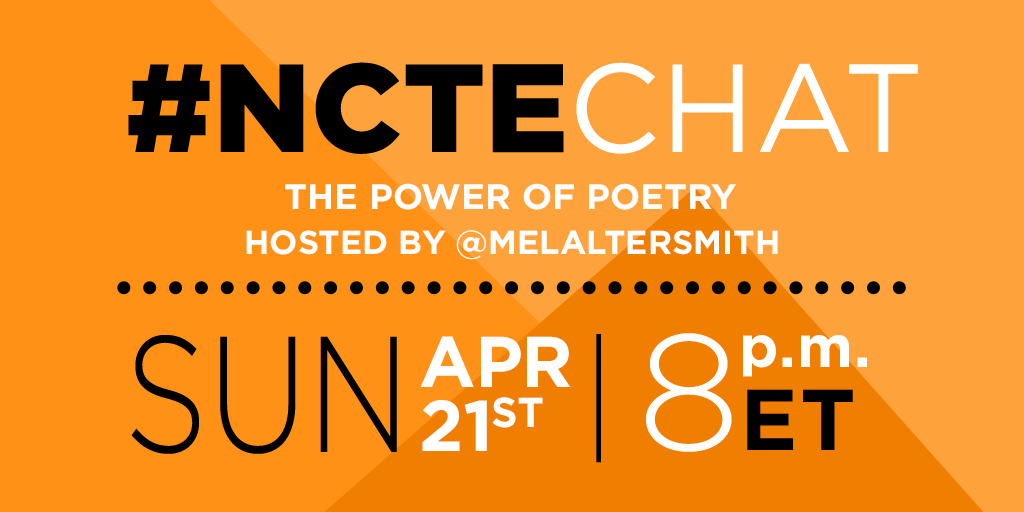Join us Sunday, April 21, at 8:00 p.m. ET for our April #NCTEchat on The Power of Poetry with guest host Melissa Smith (@MelAlterSmith).
Poetry is powerful. More so than all other written forms, I would argue. Poet Jericho Brown, in his Lambda Literary essay, “A New Way of Living,” explores the question, “What can a poem do?” Brown says, “A poem causes in readers an emotional reaction. It begins to work on the reader’s mind.” And he doesn’t mean counting syllables and finding metaphors; he means that poems make us think. Poems can make us look at something we see on a daily basis in a new way. He continues, “The poem is a poem because it asks us to reconsider ourselves. This change of mind leads to a change in action (or to changing inaction).”
When students first enter my class, poetry is not something they get excited about. They actually dread it. To them, it is all old, dead white guys writing about nothing that is of any relevance to them. The language is hard to understand, and the topics are distant to them.
I am not encouraging a complete omission of canonical poetry. There is a place for those poems, too, but they can’t be the ONLY poems we teach.
Let’s not close the door on the canon, but open it wider to allow the voices of today’s poets into your classroom.
Teaching living poets allows for many advantages:
- Language that is more accessible and current
- Subject matter that is more relevant and timely
- Incorporation of other voices in addition to those of the canon
- Bridges to understanding paired canonical poems
- More potential for identification and connection
- Ability to contact the poet and ask questions, to have personal interaction with authors
- Video and audio recordings of poets reading their own work
Teaching modern poetry can be intimidating for even the most experienced teachers. I’ve been an English teacher for over fifteen years, and up until just a couple of years ago, I admit I was intimidated by contemporary poetry. I can’t Google analysis for poems that just came out; there are no answer keys for the poems of today. The thought of being exposed or vulnerable in front of my students initially struck fear into my teacher heart. I thought I was the one who always had to have the answer, to be the gatekeeper to the secret meaning behind the poem. It was a mental paradigm shift for me to let this type of mindset go.
Embracing the idea of discovering and exploring poems alongside my students has revolutionized my teaching.
I am no longer the dispenser of knowledge, but simply a facilitator of learning. This mentality has allowed so much more freedom to explore poetry with my students. Leaning into this new teaching style has also allowed my students to feel a sense of empowerment. Time and time again, they teach me new ways to look at a poem. It’s a collaborative effort, allowing students to feel more engaged and to have a sense of ownership of their learning.
The #TeachLivingPoets hashtag was created with the intention of building a community of educators dedicated to complicating the canon and empowering students through poetry. It provides a space to share ideas about teaching contemporary poetry—to share poets we love, poems we find impactful, and best practices to engage our students. With projects like NCTE Verse and ReadWriteThink.org, teachers have the ability to change our students’ perception of poetry.
The following questions will be shared during our Twitter chat, after introductions:
Q1. Why is teaching poetry important? What obstacles or fears do some teachers have when it comes to teaching poetry? #NCTEchat
Q2. How do you use poetry in your classroom to facilitate building community? #NCTEchat
Q3. In what ways might we be able to incorporate more poetry into our weekly or monthly routines? What advice would you offer to a teacher who doesn’t teach much poetry at all? Where do they start? #NCTEchat
Q4. Share a successful strategy you’ve used for teaching the reading and understanding of poetry. Include grade level (early, middle, secondary, post-sec). #NCTEchat
Q5. Share a favorite poem (with link if possible) that has been successful in your classroom and briefly explain what you do with it and/or why your students enjoy it. #NCTEchat
Q6. What is one takeaway from tonight’s chat that you want to incorporate into your classroom? #NCTEchat
We hope to see you there! Be sure to join us by using #NCTEchat.
Never participated in a Twitter chat before? Check out this guide to help you get started.
About the host:
Melissa Smith teaches AP literature, 11th-grade American literature, and creative writing at Lake Norman Charter High School in Huntersville, NC. She is 2017 District Teacher of the Year, an NCETA Executive Board member, and a National Board Certified Teacher. She has presented at NCTIES, WVELA, NCETA, NCTE, and the AP Annual Conference, and is currently coauthoring a book on teaching poetry. Melissa is a contributing author for aplithelp.com, the creator of the #TeachLivingPoets hashtag, and the manager and editor of teachlivingpoets.com. She was the keynote speaker at NCETA’s 2019 spring symposium, where she shared her passions for complicating the canon, supporting teachers, and empowering students through poetry. You can follow her on Twitter and Instagram @MelAlterSmith.

